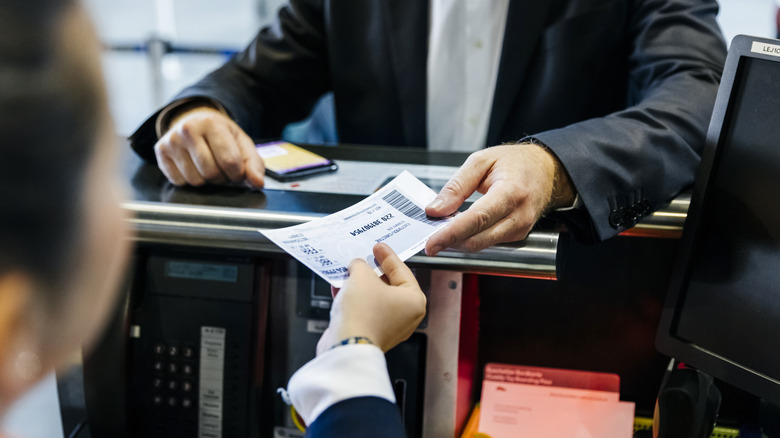The Special Boarding Pass Code Some Frequent Fliers Strive To Get
There is a lot of information on your boarding pass that you may never even notice. You probably take note of your seat number, gate, and boarding group, while the other codes and sequences may not mean much to you. However, they can have a lot of impact on how your flight, or at least your check-in, is going to go.
One code that can sometimes affect your travels is your boarding pass sequence number. This is the number that follows the letters "SEQ," and it indicates the order in which you checked in. A higher number (and thus a later check-in) can affect your seat on airlines like Southwest, which assigns you a boarding order based on it. Other than that, the sequence number mostly doesn't matter — that is, unless you're a frequent flier who enjoys geeking out over these things. Some fliers covet the rare boarding code "SEQ 001," which means you're the very first to check in for the entire flight.
Of course, bragging rights are really the only benefit beyond your personal enjoyment over being first. In fact, in one post on FlyerTalk, someone asked if the "001" sequence gets you anything. Poster HighwayToHEL wrote back, "Yes, it puts a smile on your face. It's just 'one of those things.'" If this sounds like your M.O., you should know that you can miss out on the coveted "SEQ 001" if you have a connecting flight where your boarding pass is issued to you before official check-in for that flight opens.
Other codes to look for on your boarding pass
There are other things on your boarding pass that can affect your experience more than "SEQ 001," however. On the benign side of things, if you see the code "FQTV" on your boarding pass, followed by numbers, it simply means you're part of a frequent flier program. If you happen to see the code "SSSS," it means you've been selected for a secondary screening by security. Your carry-on bag will be examined more closely, and you may get a pat-down from a TSA agent and be swabbed to detect explosives. These special screenings are more likely to happen to those who book one-way tickets, pay in cash, or fly to certain flagged locations. You may also find the words "See Agent" on your boarding pass, which can mean you haven't yet been assigned a seat (as sometimes happens with basic economy tickets); you're taking a "codeshare" flight, meaning it's run by a different airline; you need other documents checked, like a visa; or you might be asked to volunteer to get bumped if the flight is oversold.
Another code you may see is "S/O," which means you have a stopover, or "SPTC," meaning your stopover will last more than a few hours. No matter what codes you find, don't throw away your boarding pass. It may have a barcode that's linked to your travel details and confirmation code, which could allow a bad actor to access your private information. It's a good idea to shred your old passes if you don't save them, just in case. Plus, if you get the elusive "SEQ 001" code, you're probably going to want to save it anyway.

